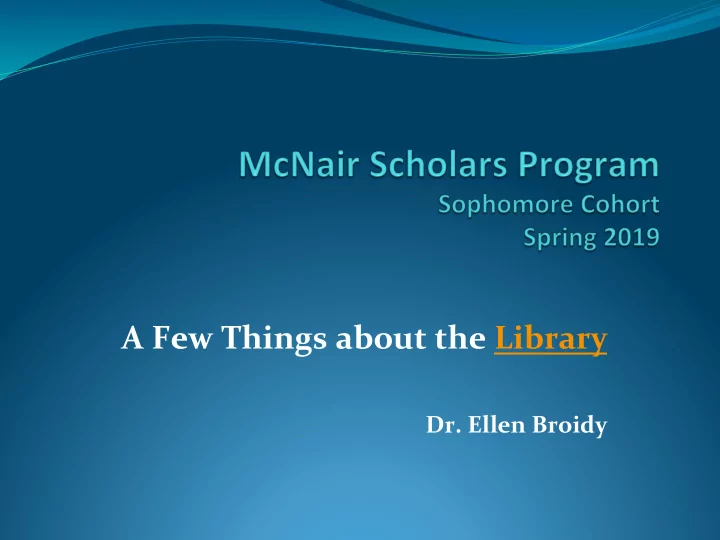

A Few Things about the Library Dr. Ellen Broidy
Searching using Boolean Logic AND Homelessness AND Children This type of search will result in entries that must contain both words. You may use “AND” to narrow a search . OR Infants OR Babies This type of search will result in entries that contain either of the words. Use “OR” to broaden a search . NOT Penguin NOT Pittsburgh What do you think NOT does?
Wildcards and Trunca4on: Examples from EBSCO Wildcards You can use three types of wildcard characters in your search terms. The question mark (?) matches exactly one letter. The pound or hash sign (#) matches zero or one character. The asterisk (*) matches multiple characters. Use wildcards to create searches where there are unknown characters, multiple spellings or various endings. None of the wildcards can be used as the first character in a search term. Question-mark wildcard To use the ? wildcard, enter your search terms and replace each unknown character with a ?. For example, type ne?t to find all records containing neat , nest or next . Pound/hash wildcard To use the # wildcard, enter your search terms and place # where an alternate spelling might contain an extra character. For example, type colo#r to find all citations containing color or colour . Note : When using the pound/hash (#) wildcard, plurals and possessives of that term are not searched. For example, when running a search for the term colo#r, the terms "colors" and "colours" will not be searched (which they are by default when using the singular "color" or "colour" without a wildcard operator). Asterisk wildcard (also called Truncation symbol) To use the asterisk (*) wildcard, enter the root of a search term and replace the ending with an *. For example, type comput* to find the words computer or computing . The asterisk (*) may also be used between words to match any word. For example, 'midsummer * dream' will return results that contain the exact phrase, 'midsummer night’s dream.‘ NOTE: Wildcards/truncation *not* necessary consistent across databases. Always refer to “help” screens
Ar4cles and Databases Organized by subject; further organized by Most Recommended For… and All Databases For… Chemical Engineering: SciFinder, Compendex Black Studies: Black Studies Center, Ethnic Newswatch Sociology: Sociological Abstracts Global Studies: PAIS, Social Sciences Database Economics: Econlib, RePEc (Research Papers in Economics) Environmental Studies: Environment Index, Agricultural & Environmental Science Database Physics: ArXIV, Compendex, Lecture Notes in Physics
All Databases For… Ø Useful across disciplines Ø Useful for interdisciplinary/multidisciplinary research Ø Excellent places to start
Some of Dr. E’s Favorites Web of Science ( WoS ) JSTOR Academic Search Complete Proquest Dissertations and Theses
What’s So Special About WoS Basic search: pretty straight forward: Search for terms in topic, title, author Cited Reference Search: gets a lot fancier Search for articles that “cite” a particular work
What’s So Special about Disserta3ons? Dissertations provide great “raw” material Dissertations let you know which faculty are interested in what subjects Dissertations provide snapshot of who studied what in which school/department Dissertations are in your future; make sure to read a few (to get a sense of what they ’re are all about)
Recommend
More recommend